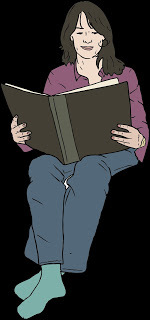Reviewers Who Help Sell Your Book: Why Unknown Authors Should Handpick Their First Few Reviewers

Book reviewers, to my mind, are the best publicity for a good book. Every author has an ideal reviewer, one who praises his or her work to high heaven! Alas, a good reviewer writes reviews for potential readers, not for the author.
Trying to break into a saturated book market isn't easy. If what you've written is unique and interesting you need to give it every chance to stand out from the rest. Book reviewers play a major role, and an unknown author needs the best.
This article is for authors, especially unknown authors, to
understand the importance of handpicking their first few reviewers.
From the author’s perspective, the purpose of a review is
simply to let other readers know whether the book is worth picking up or not.
Going Through Indian Blogging Platforms: They advertise your book well. Their reach is a definite
plus.
The major disadvantage of going through an Indian blogging
platform is the way they pick reviewers. The platform invites
bloggers to read and review your book. Whether these bloggers are capable of
doing a book review isn't a consideration. Often, the blogger's language
skills leave a lot to be desired. For a potential reader not to understand what
the reviewer is trying to say is, at best, an opportunity lost. At worst, the potential reader ends up ascribing the same language skills to the author and loses
interest in the book.
Till blogging platforms come up with stricter criteria for
reviewers, it is best for unknown authors to research and handpick their first
few reviewers. Besides, the author pays a tidy sum to use their platform - another minus for a new author, in my opinion. (I don't know what publishers pay so am unable to comment.)
I am aware that some believe it is the number of reviews
that count, not the quality. Let unknown authors make both count.
This is what I would look for in my ideal reviewer:
He is well read. Why? To have him discuss my style of writing, characterisation
and plot through comparisons with other authors would give potential readers a
good picture of what to expect from my book.

She is Tactful. Or Not.
It is a balancing act. Do look to see if your reviewer speaks with a tactful yet clear voice. You should know after reading the review whether she liked the book or not. If she did it should reflect in her review. If she didn't, look to see if she hesitates to say so. A reviewer cannot be too kindly or too polite. That isn't fair to the potential reader. Besides, it compromises her own
credibility.
Qualifiers: A review is personal to a great extent, but it isn't enough to say, 'I loved/hated the book'.
Does the reviewer qualify his opinion with why he thinks it detracts from or enhances the overall plot?
She is honest and fearless about putting her likes/dislikes/opinions out there. Her reviews aren’t
plagiarised. They reflect her thoughts about the book and no one else’s.
She reads the book completely and writes a review from her own perspective. No
one else’s. I’ve heard of people who read the first few pages of a book and search for reviews on Google before writing theirs. I would stay away from
those. A potential reader wants a variety of opinions, not just one that is
then copied and packaged differently by multiple reviewers.
Be aware of
the power of suggestion. Pick reviewers who aren’t swayed by another’s opinion.
What if someone suggests something negative about your book? I know of one such case. Someone, for whatever reason, wrote to say he wasn't even going to read the book as the
cover wasn’t good enough. Luckily for the author, someone who had already read
the book responded by saying he had read the book and enjoyed it.
The result? Many reviewers genuinely thought the
cover wasn't good and thought fit to mention the 'fact'. New authors must decide for themselves if they would pick such reviewers for their book.
The Length: Nobody wants to read a book about a book. That might put a
potential reader off. In my opinion, a short review is better than a long one.
The Style: I would pick someone who keeps the review simple and still
manages to give the potential reader a feel for the book. If the reviewer is
astute enough to understand and analyse the scope of the book, that is a plus.
I would pick someone who reviews what the author has written
and not what he feels the author should/shouldn't have explored.
The Genre: Just briefly, I wouldn't pick someone who is known to review Spy
Thrillers, to review a Romance. Would you?
My thoughts have turned to reviewers as I have completed the first draft of my second novel. The book is a sequel to "Never Mind Yaar." It is a long way from being published, but I've started collecting names of reviewers whose reviews I've read and enjoyed.
A Sneak Peek: The young idealists are grown. Binaifer (Binny, for short,) is invited, along with her cousins, to her aunt's home in Mumbai. She has fond memories of Armaity House.
The entire clan used to gather there every December for school holidays. At fifteen, Tehmton, one of her cousins, knew he wasn't returning the following year. He had a dark secret which, in a moment of weakness, he shared with Binny. She was fourteen at the time.
Now, ten years on, she is eager to find out how things worked out for him. What he tells Binny, and the grave repercussions it has for the extended family, is the heart of the story.
Tehmton is the main protagonist.
A small qualifier - It is beyond the scope of this post to tell reviewers how to do their job. It is to let new, or unknown authors understand the importance of picking their first few reviewers with care.


Published on September 25, 2015 22:05
No comments have been added yet.



